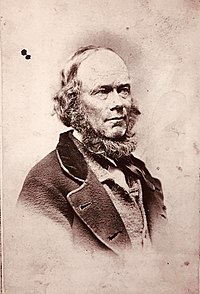Jonathan Browning (inventor)
| Jonathan Browning | |
|---|---|
 | |
| Personal details | |
| Born | October 22, 1805 Sumner County, Tennessee, United States |
| Died | June 21, 1879 (aged 73) Ogden, Weber County, Utah |
| Resting place | Ogden City Cemetery 41°13′59″N 111°57′43″W / 41.233°N 111.962°W |
| Home town | Ogden, Utah, United States |
| Known For | Harmonica gun |
| Occupation | Blacksmith and Gunsmith |
| Spouse(s) | Elizabeth Stalcup m. 1826, Elizabeth C. Clark m. 1854, Ann Emmett m. 1858 |
| Children | 22, including: John M Browning Matthew S. Browning |
| Parents | Edmund Browning Sarah B. Allen |
| Relatives | Including: Val A. Browning (grandson) |
Jonathan Browning (October 22, 1805 – June 21, 1879) was an American inventor and gunsmith.
Early life[]
Jonathan Browning was born on October 22, 1805, in Sumner County, Tennessee. He began his career as a blacksmith, but by 1824 switched to become a gunsmith after an apprenticeship with Samuel Porter in Nashville. He began producing firearms independently by 1831 and shortly thereafter invented a "sliding breech" repeating rifle, also called a Harmonica gun, between 1834 and 1842 while living in Quincy, Illinois. Each Harmonica gun took two weeks to manufacture by hand and was available to purchase for $24.00. Browning moved his family to White's Creek, near Nashville, about 1827, and resided there until the spring of 1833. Jonathan moved with his extended family and spent a season in Fairfield, Illinois, visiting with his sister Clarissa Neel. About 1834, Jonathan and his brother James Green Browning bought farms thirty miles northeast of Quincy in La Prairie, Illinois. A family story has been passed down that he came to know a young lawyer named Abraham Lincoln, an overnight guest in his home on at least two occasions.
Missouri period[]
In October 1838, Governor Lilburn Boggs issued the Extermination Order that caused the followers of Joseph Smith to flee Missouri. Browning came into contact with many of the Latter-day Saint exiles. Curious about the new settlement in Nauvoo, Illinois' swampy lands, Browning paid a visit, meeting with the Latter Day Saints president Joseph Smith, which influenced Browning to convert to the Church of Jesus Christ of Latter-day Saints.[1][2]
Nauvoo period[]

Jonathan Browning Home and Gunsmith Shop, Nauvoo, Illinois. Browning lived and worked in these buildings from 1842-1846. Browning moved to Nauvoo, Illinois, and joined the community in 1842, buying the Bird home and adding a connecting gunshop. In 1844, the Prophet Joseph Smith was assassinated, and Browning was among the group which later fled Nauvoo in 1846. Guns that Browning produced as a Mormon gunsmith were labeled "Holiness to the Lord - Our Preservation". The Jonathan Browning Home and Gunshop, built in 1842, was restored during the 1960s. Registered with The Mormon Historic Sites Foundation, the museum is open to the public at no charge.[3]
Utah period[]
Browning fled Illinois with Brigham Young in late 1846 to escape religious persecution. He settled in the community of Mosquito Creek near Council Bluffs, Iowa, and repaired guns for the local settlers who were migrating to Utah, while awaiting Brigham Young to invite him to join the main body of settlers in Utah. When the Mormon Battalion was formed during the War with Mexico, Browning wanted to join them, but was told by Young that his skills would not be needed by the soldiers as much as by the pioneers' main body in Kanesville. Browning received word from Brigham Young to join the main party of settlers in 1852. He left Mosquito Creek, Iowa, July 8, 1852, and migrated across the Rocky Mountains as the captain of ten wagons in the Henry W. Miller Company. He arrived on October 2, 1852, with six wagons and $600 to the Salt Lake Valley. Browning moved to Ogden, Utah, where he established a gun shop. As was common in the community, Jonathan Browning was a polygamist, having taken three wives. He fathered 22 children and had two stepdaughters; prominent among them was the gun designer John Moses Browning, who became one of the most important figures in developing modern automatic and semi-automatic firearms; and Matthew Sandefur Browning (1859 – 1923), co-founder of Browning Brothers. Jonathan ran his gun shop and invested in real estate in Ogden. He was a member of the Utah Territorial Assembly (1853-1854) and served as Justice of the Peace and Probate Judge for Weber County, Utah Territory. His primary focus, though, was on his gun shop located along present-day Washington Avenue in Ogden. His son John Moses later recalled, "We ridiculed some of the guns we fixed, and I damned some of them when Pappy wasn't near, but it never occurred to us to make better ones. He was too old, and I was too young." Jonathan died on June 21, 1879, in Ogden.
References[]
- John Browning & Curt Gentry. John M. Browning, American Gunmaker. New York: Doubleday, 1964.
External links[]
- 1805 births
- 1879 deaths
- Latter Day Saints from Tennessee
- 19th-century American inventors
- Converts to Mormonism
- Firearm designers
- Mormon pioneers
- Latter Day Saints from Utah
- Latter Day Saints from Illinois
- People from Sumner County, Tennessee
